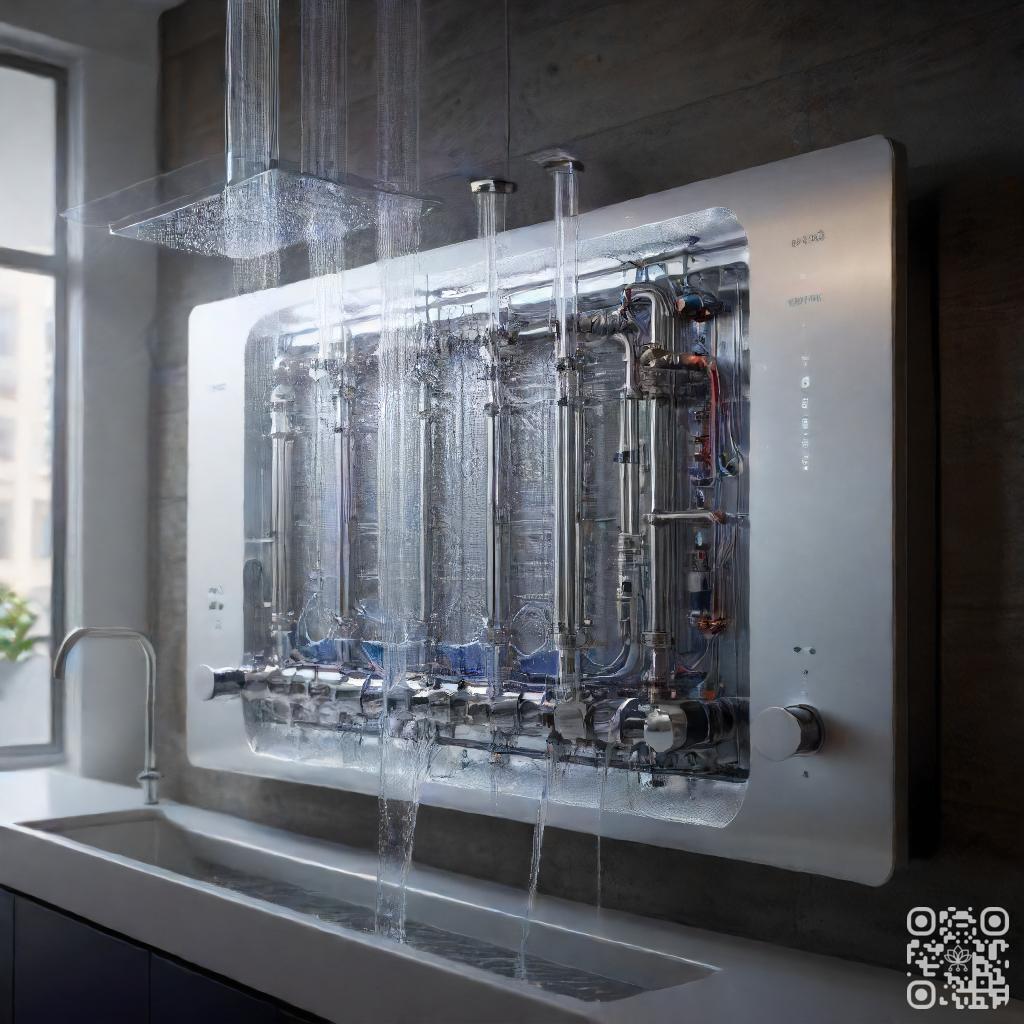
II. Water softeners can effectively reduce the amount of minerals in the water, decreasing the likelihood of leaks in water heaters.
III. Regular maintenance and cleaning of water heaters, in conjunction with the use of a water softener, can significantly prolong the lifespan of the appliance.
Water softeners are an effective solution for addressing leaks in water heaters. These devices work by removing minerals and sediments from the water, preventing them from building up inside the water heater and causing leaks.
By using a water softener, you can prolong the lifespan of your water heater and avoid costly repairs. Say goodbye to leaks and enjoy a reliable and efficient water heating system with the help of water softeners.
How Water Softeners Work
In this section, we will pioneer the science behind water softening and understand how it works to improve the quality of your water.
The Science Behind Water Softening
Water softening is a process that involves removing minerals, such as calcium and magnesium, from hard water. Hard water contains high levels of these minerals, which can cause a variety of issues in your home, including limescale buildup, reduced efficiency of appliances, and dry skin and hair.
Water softeners use a process called ion exchange to remove these minerals from the water. The water passes through a tank filled with resin beads that are coated with sodium ions. As the water flows over the resin beads, the sodium ions are exchanged with the calcium and magnesium ions, effectively softening the water.
This ion exchange process is facilitated by a control valve that regulates the flow of water and triggers the regeneration cycle when the resin beads become saturated with calcium and magnesium ions. During the regeneration cycle, a brine solution is used to flush out the accumulated minerals and recharge the resin beads with sodium ions, making them ready to soften the water again.
Common Types of Water Softeners
There are several types of water softeners available in the market, each with its own unique features and advantages. The most common types include:
| Type | Description |
|---|---|
| Salt-Based Water Softeners | These water softeners use salt to regenerate the resin beads and are highly effective in removing minerals from hard water. |
| Salt-Free Water Softeners | These systems do not remove minerals from the water but instead prevent them from causing limescale buildup through a process called template-assisted crystallization. |
| Dual-Tank Water Softeners | These systems have two resin tanks, ensuring a continuous supply of softened water even during the regeneration cycle. |
Benefits of Using Water Softeners
Using a water softener in your home can have numerous benefits, including:
- Reduced Limescale: Water softeners prevent limescale buildup on faucets, showerheads, and appliances, prolonging their lifespan and improving their efficiency.
- Softer Skin and Hair: Soft water is gentler on the skin and hair, reducing dryness and irritation.
- Improved Appliance Performance: Soft water prevents mineral deposits from clogging pipes and appliances, allowing them to function optimally.
- Cost Savings: By preventing limescale buildup, water softeners can help you save money on repairs and extend the lifespan of your appliances.
Signs of hard water
Hard water can have a significant impact on the quality of water in your home. By mastering the signs of hard water, you can take steps to address the issues it may cause. Here are some key indicators:
1. Identifying hard water in your home
One of the most common signs of hard water is the presence of mineral deposits. These deposits can appear as a white, chalky substance on faucets, showerheads, and other fixtures. Additionally, you may notice that soap doesn’t lather well and leaves a residue on your skin and hair.
2. Effects of hard water on water heaters
Hard water can have a detrimental effect on your water heater. The minerals present in hard water can build up in the tank and heating elements, reducing the efficiency of the heater and shortening its lifespan. This can lead to higher energy bills and the need for more frequent repairs or replacements.
3. How hard water causes leaks
Over time, the mineral deposits from hard water can accumulate in the pipes and plumbing fixtures of your home. This buildup can cause clogs and corrosion, leading to leaks and water damage. By approaching the issue of hard water, you can help prevent these costly and inconvenient leaks.
Addressing leaks in water heaters with water softeners:
One effective solution to combat the effects of hard water on water heaters is the use of water softeners. These devices work by removing the minerals that cause hardness from the water supply, preventing buildup and reducing the risk of leaks. By installing a water softener, you can prolong the lifespan of your water heater and improve its overall efficiency.
Choosing the Right Water Softener
In terms of selecting a water softener for your home, there are several important factors to consider. Making the right choice will ensure that you have access to high-quality, softened water for all your needs. Here are some key considerations:
1. Factors to Consider When Selecting a Water Softener
- Water hardness: Determine the level of hardness in your water supply. This will help you choose a water softener with the appropriate capacity and efficiency.
- Size and capacity: Consider the size of your household and the daily water usage. Choose a water softener that can handle your specific needs.
- Regeneration process: Different water softeners use different regeneration processes, such as time-based, meter-based, or demand-initiated regeneration. Understand the pros and cons of each to make an informed decision.
- Salt-based or salt-free: Decide whether you prefer a salt-based water softener or a salt-free alternative. Each has its own advantages and disadvantages.
- Water and salt efficiency: Look for a water softener that is both water and salt efficient. This will help you save on operating costs and reduce environmental impact.
2. Popular Brands of Water Softeners
There are several reputable brands in the market that offer reliable and high-performing water softeners. Some of the popular ones include:
- Brand A: Known for their innovative technology and excellent customer reviews, Brand A offers a range of water softeners suitable for different household sizes.
- Brand B: With a long-standing reputation in the industry, Brand B provides durable and efficient water softeners that guarantee softened water throughout your home.
- Brand C: Offering user-friendly features and advanced water softening capabilities, Brand C is a top choice for homeowners looking for quality and reliability.
3. Installation and Maintenance of Water Softeners
Proper installation and regular maintenance are essential for the optimal performance of your water softener. Here are some important points to keep in mind:
- Professional installation: It is recommended to have your water softener installed by a professional to ensure proper setup and functionality.
- Regular cleaning and maintenance: Follow the manufacturer’s guidelines for cleaning and maintaining your water softener. This will prolong its lifespan and efficiency.
- Salt and resin replacement: Monitor the salt and resin levels in your water softener and replace them as needed to maintain optimal performance.
- Water quality testing: Periodically test the water quality to ensure that your water softener is effectively removing hardness minerals.

How Water Softeners Prevent Leaks
The Impact of Water Softeners on Water Heater Lifespan
Water softeners play a crucial role in maintaining the longevity of water heaters. By removing minerals such as calcium and magnesium from hard water, they prevent the accumulation of scale inside the appliance. This scale buildup can lead to inefficiency and strain on the water heater, ultimately shortening its lifespan. With the use of a water softener, the risk of leaks caused by excessive mineral deposits is significantly reduced.
Reduction of Mineral Buildup in Water Heaters
Mineral buildup is a common problem in water heaters, especially in areas with hard water. It occurs when minerals from the water precipitate and form a layer of scale on the heating elements and the interior of the tank. This buildup not only affects the efficiency of the water heater but also increases the likelihood of leaks. Through inclusion a water softener into the system, the minerals are removed before they can cause any damage, resulting in a reduced risk of leaks and improved performance.
Prevention of Corrosion in Water Heaters
Corrosion is another factor that can contribute to leaks in water heaters. When hard water comes into contact with metal components, it can lead to the formation of rust and corrosion over time. This corrosion weakens the integrity of the tank and pipes, making them more susceptible to leaks. Water softeners help prevent corrosion by removing the minerals that can accelerate this process. By maintaining a corrosion-free system, the risk of leaks is minimized, ensuring the longevity of the water heater.
| Benefit | Description |
|---|---|
| Extended Lifespan | Water softeners prevent scale buildup, increasing the lifespan of water heaters. |
| Improved Efficiency | By reducing mineral deposits, water softeners optimize the performance of water heaters. |
| Reduced Maintenance | With fewer mineral-related issues, water heaters require less frequent maintenance. |
| Cost Savings | By preventing leaks and the need for repairs, water softeners save money in the long run. |

Other benefits of using water softeners
1. Improved water quality for household use
Using a water softener can greatly improve the quality of water in your home. Hard water contains high levels of minerals such as calcium and magnesium, which can leave behind residue and build-up on your fixtures, appliances, and dishes. By softening the water, you can eliminate these minerals and enjoy cleaner, clearer water throughout your home.
2. Health benefits of using soft water
Soft water not only improves the quality of your water, but it can also provide health benefits for you and your family. Hard water can be harsh on your skin and hair, often leaving them dry and dull. By using a water softener, you can enjoy softer water that is gentler on your skin and hair, leaving them feeling smoother and more hydrated.
3. Cost savings on energy bills
Using a water softener can also lead to cost savings on your energy bills. Hard water can cause mineral buildup in your pipes and appliances, reducing their efficiency and causing them to work harder. By softening the water, you can prevent this buildup and extend the lifespan of your appliances, ultimately saving you money on repairs and replacements.
| Benefit | Description |
|---|---|
| Improved water quality | Eliminates mineral residue and build-up |
| Healthier skin and hair | Gentler and more hydrating |
| Cost savings on energy bills | Prevents mineral buildup and improves appliance efficiency |
Bottom Line
Water heaters are an essential part of our daily lives, but leaks can cause significant damage and inconvenience. Water softeners can help prevent leaks by reducing the buildup of minerals and sediment in the tank. They also improve the efficiency and lifespan of the water heater, saving you money in the long run. Conversely, it’s important to choose the right water softener for your specific needs and to maintain it properly to ensure it continues to work effectively. By dealing with leaks in water heaters with water softeners, you can enjoy hot water without the worry of costly repairs or replacements.
Investing in a water softener is a smart choice for homeowners who want to protect their water heaters and improve the quality of their water. With the right system in place, you can enjoy the benefits of soft water at the same time avoiding the headaches of leaks and repairs. So, if you’re experiencing issues with your water heater, consider installing a water softener to address the problem and enjoy the peace of mind that comes with a reliable and efficient system.
Read More:
1. Water Heater Leaks And Impact On Energy-Efficient Homes
2. Leaks And Their Impact On Water Heater Warranty Coverage
















